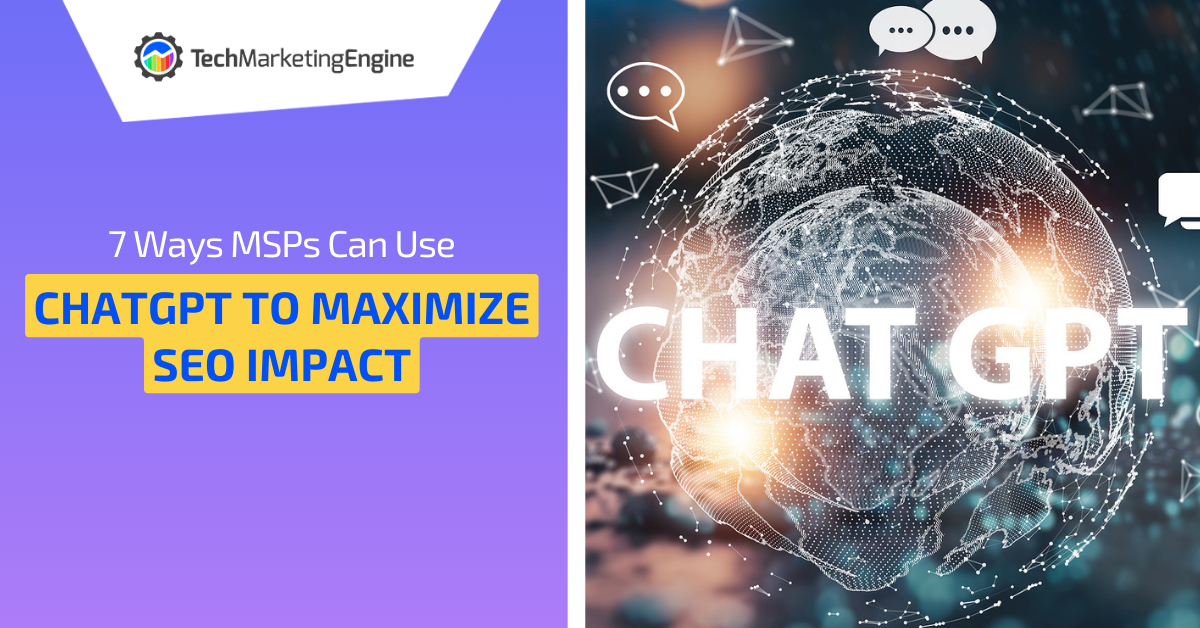
How do you get found in the vast world of the internet? The key is good search engine optimization (SEO). Applying SEO best practices helps your IT business rank well on search engines, which in turn attracts more leads.
But with so much competition and changing algorithms, how can you stay ahead of the curve and optimize your online presence?
One way is to use ChatGPT (or Microsoft’s Copilot) to help you in several ways. Using these tools can save you time on everything from keyword research to generating meta tags. Read on to learn how this GenAI phenomenon can help you boost your SEO performance and grow your business.
Why Leverage ChatGPT for Help with SEO?
The #1 traffic source for all types of websites is organic search. People type in a keyword term, like “cybersecurity solutions Cleveland,” and are served up a list of websites that match their query.
You get included in that list by optimizing your site for those searches. SEO is both an art and a science. You need to follow the best practices of keyword use and placement, as well as know what meta tags are and how to use them. It’s also important to know which keywords you should be sprinkling within each page and blog post.
For example, using long-tail keywords to take advantage of the fact that they’re used in about 70% of Google searches. Also, generating fresh keywords for each page, instead of using the same ones for all.
As you can see, we’re only a few best practices in, and things are already getting complicated. This is where ChatGPT can help. It can help you cut through the learning curve and generate the things you need to improve your site’s SEO fast.
Here are some of the benefits of using ChatGPT to maximize your SEO impact:
- Save time and money
- Improve the attraction of your headlines
- Enhance personalization
- Improve the use of long-tail keywords
- Help to generate an SEO gameplan
How to Supercharge Your Search Optimization with ChatGPT
Keyword Research and Expansion
Effective keyword research is the cornerstone of successful SEO strategies. ChatGPT can assist MSPs in identifying relevant keywords and uncovering long-tail keywords that may have been overlooked.
By providing seed keywords and industry-specific terms, MSPs can leverage ChatGPT to generate a comprehensive list of keywords, helping to broaden their reach and capture a larger audience.
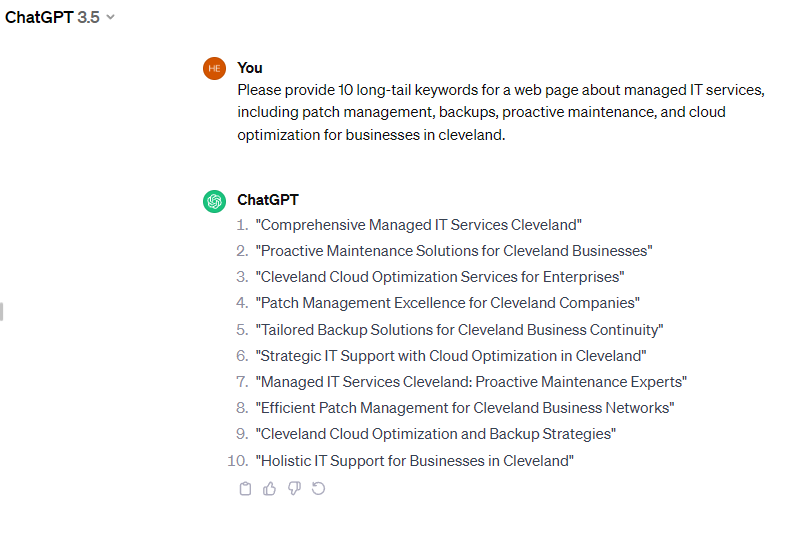
Now you may not want to simply copy/paste the suggestions you get from ChatGPT. Some may be more popular search terms than others. But they will definitely give you a starting point to help you find unique and relevant keywords for each page and blog post on your site.
Moreover, ChatGPT can aid in understanding user intent behind specific keywords, enabling MSPs to tailor their content to meet the needs and expectations of their target audience. This nuanced approach to keyword research enhances the overall effectiveness of SEO campaigns.
Read more: “Get More Search Traffic for Your MSP Site Using Long-Tail Keywords”
Generating Compelling Meta Descriptions
Meta descriptions play a crucial role in enticing users to click on a search result. Crafting compelling meta descriptions that accurately represent the content of a page is an art. ChatGPT can be employed to generate persuasive meta descriptions that not only incorporate relevant keywords but also encourage users to click through to the website.
MSPs can input information about their products, services, and unique selling propositions into ChatGPT, prompting it to generate meta descriptions that highlight key features and benefits. This personalized touch adds a human element to the meta descriptions, making them more appealing to potential visitors.
Just put in the parameters for meta tag best practices and let the algorithm do the work for you. Here are some prompts to use for a recommended number of characters for meta tags:
- Title tag: 60 characters
- Meta description: 155-160 characters
Tip: First ask for your keyword list, then hone it down to about 5 keywords you want to use for that page.
Next, input: “Write a title that is 60 characters long and a meta description that is 155 characters long. Both should incorporate some of the following keywords: <keyword>, <keyword>, <keyword>, <keyword>, <keyword>.”
Cluster Keywords by Relevance (aka Semantic Reference)
ChatGPT’s proficiency in natural language processing empowers MSPs to go beyond traditional keyword grouping. Instead of relying solely on surface-level similarities, ChatGPT delves into the contextual nuances that define the semantic relationships between keywords. This semantic understanding allows for a more refined and strategic approach to SEO.
Creating keyword clusters helps you take a large keyword list and organize it according to different page topics, such as “cybersecurity” or “cloud services.”
With ChatGPT, you can provide a set of keywords related to your services or specific content focus, prompting the model to intelligently group them based on semantic similarities. The result is a well-organized cluster of keywords that can be strategically incorporated into content to enhance its relevance and depth.
Here is the prompt:
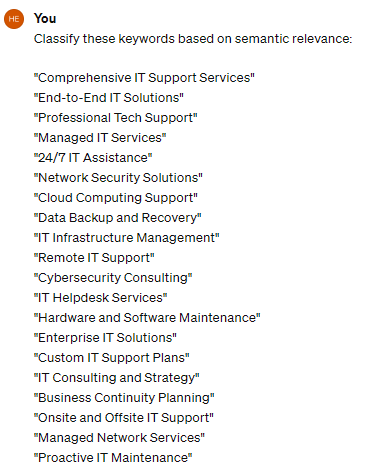
Here is the result (keywords nicely grouped into service page categories):
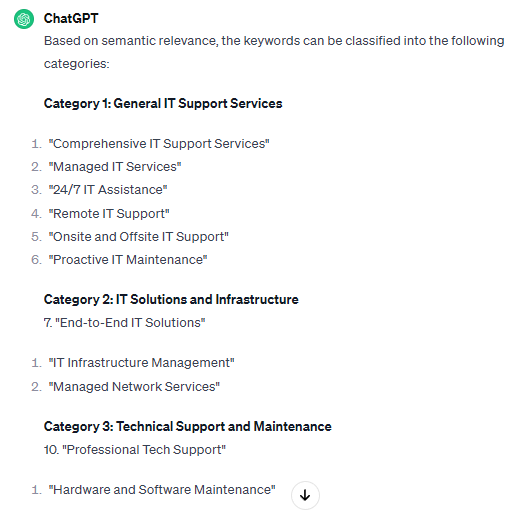
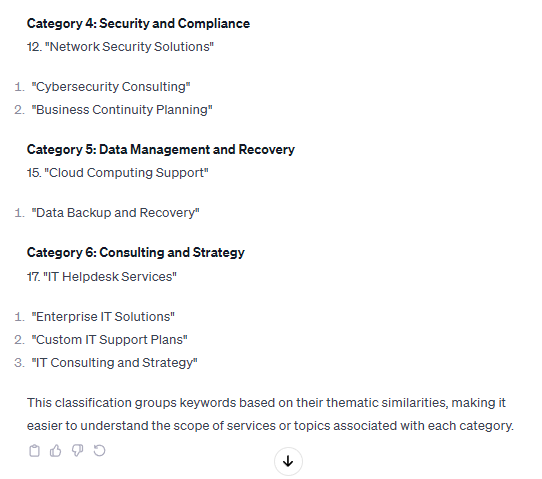
FAQ Pages and Conversational SEO
As voice search and conversational AI become more prevalent, IT business owners need to adapt their SEO strategies accordingly. ChatGPT excels in generating conversational and natural-sounding responses, making it an ideal tool for creating FAQ pages optimized for voice search.
You can input common customer queries and industry-specific questions into ChatGPT, allowing it to generate detailed and informative answers. This not only enhances the user experience but also signals to search engines that the website provides valuable, relevant information.
Creating the Perfect Headlines
Crafting compelling headlines is an art, and in the realm of SEO, it’s a critical skill. Here’s where ChatGPT steps in as a potent ally for IT business owners looking to attract new prospects when their page shows up on a Google search.
ChatGPT’s natural language processing capabilities make it adept at understanding user intent. By providing the model with information about the content, target audience, and key themes, you can prompt ChatGPT to generate headline ideas that align with what users are actively searching for.
A powerful headline seamlessly integrates relevant keywords. Just input primary and secondary keywords into ChatGPT, and ask it to craft headlines that not only capture attention but also contribute to the overall SEO strategy. This synergy between captivating language and strategic keyword placement enhances the visibility of content on search engine results pages.
Local Business Schema Markup
Local businesses thrive on visibility within their communities, and harnessing the power of structured data is a strategic move for optimizing local SEO. ChatGPT proves to be an invaluable asset to generate effective Local Business Schema Markup.
Generating Local Business Schema Markup can take time. IT Business owners need to research the tags to use, then figure out how to format them before putting in their own data.
ChatGPT can provide you with the structure in seconds, and then all you need to do is enter your business details into the placeholders.
Here is the prompt as well as the results:
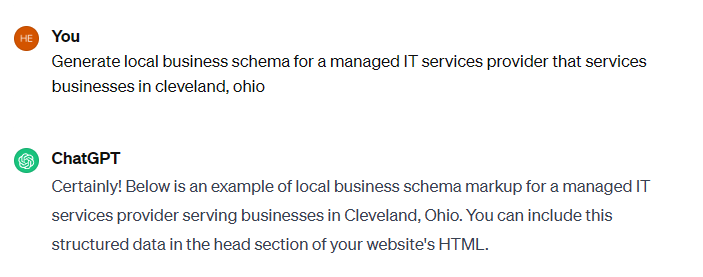
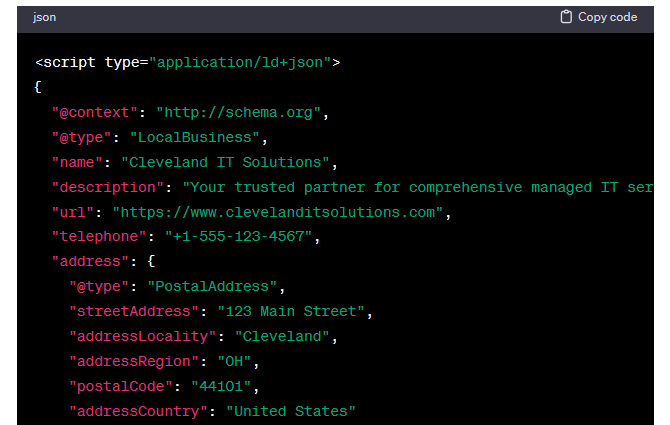
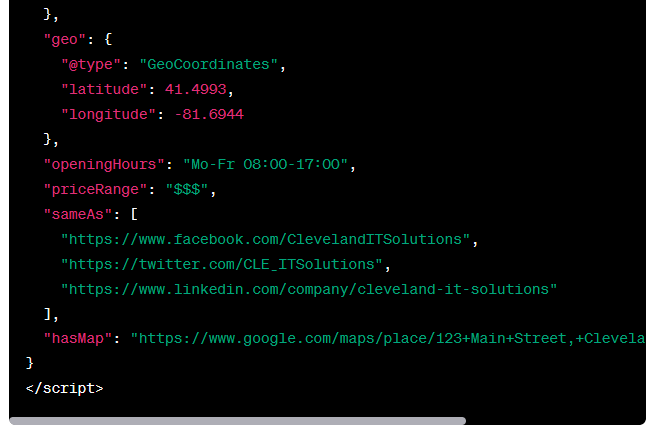

Optimize Existing Content
ChatGPT can be used to optimize existing content. By analyzing current articles and web pages, MSPs can employ ChatGPT to identify opportunities for keyword inclusion, improve readability, and enhance overall SEO performance. This ensures that the content remains fresh, relevant, and appealing to search engines.
Tips for Using ChatGPT Effectively
While ChatGPT is a powerful tool that can help you optimize your search engine visibility, it is not perfect and may not always produce the desired results. Here are some tips for using ChatGPT effectively:
- Review and edit the generated texts: ChatGPT may sometimes make grammatical errors, factual mistakes, or logical inconsistencies in the generated texts. It’s important to review and edit its text outputs before using them.
- Provide clear and specific instructions: ChatGPT may sometimes generate outputs that are irrelevant or off-topic if the instructions are vague or ambiguous. Therefore, it is important to provide clear and specific instructions on what you want. You can even ask the AI to give you a better way to give it instructions.
- Experiment and test different options: You don’t always get what you want from ChatGPT. For example, I had to use the term “Classify” instead of “Organize” to get the keyword clusters to work. So, experiment and test different prompts. If you don’t get what you want the first time, change how you ask and try again.
Boost Your SEO With a Little AI Help
By integrating ChatGPT into your SEO strategy, you can create a more dynamic and personalized online presence, driving organic traffic and improving search engine rankings. As the digital landscape continues to evolve, embracing cutting-edge technologies like ChatGPT will undoubtedly be a key differentiator for MSPs seeking to thrive in the competitive world of online marketing.
If you need help generating SEO-optimized customized content for your website, reach out to us today. We are a team of experienced MSP marketing experts who care about helping you grow your IT business.
How do you use ChatGPT in your marketing strategy? Share your thoughts in the comments.

Leave a Reply